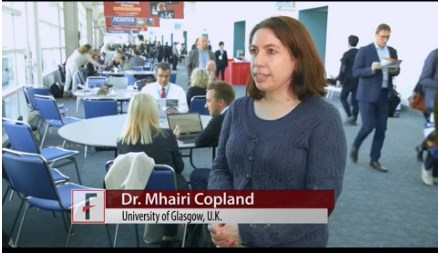User login
SAN DIEGO – Tyrosine kinase inhibitors have dramatically improved survival for patients with chronic myeloid leukemia, but for some patients with solid stable remissions, halving the TKI dose or even stopping therapy altogether, at least temporarily, appears to be safe and to offer both health and financial benefits,
In the British Destiny [De-escalation and Stopping Treatment of Imatinib, Nilotinib, or Sprycel (dasatinib)], there were 12 molecular relapses occurring between the second and twelfth month of dose reduction among 174 patients with either an MR3 or MR4 molecular response, and all patients had restoration of molecular remissions after resumption of full dose TKIs.
Coinvestigator Mhairi Copland, MD, PhD, of the University of Glasgow, Scotland, discussed in a video interview the potential clinical benefits of lower-dose therapy in patients in stable CML remissions, and notes that de-escalation strategy is associated with a nearly 50% saving in costs compared with full-dose TKI therapy.
The video associated with this article is no longer available on this site. Please view all of our videos on the MDedge YouTube channel
SAN DIEGO – Tyrosine kinase inhibitors have dramatically improved survival for patients with chronic myeloid leukemia, but for some patients with solid stable remissions, halving the TKI dose or even stopping therapy altogether, at least temporarily, appears to be safe and to offer both health and financial benefits,
In the British Destiny [De-escalation and Stopping Treatment of Imatinib, Nilotinib, or Sprycel (dasatinib)], there were 12 molecular relapses occurring between the second and twelfth month of dose reduction among 174 patients with either an MR3 or MR4 molecular response, and all patients had restoration of molecular remissions after resumption of full dose TKIs.
Coinvestigator Mhairi Copland, MD, PhD, of the University of Glasgow, Scotland, discussed in a video interview the potential clinical benefits of lower-dose therapy in patients in stable CML remissions, and notes that de-escalation strategy is associated with a nearly 50% saving in costs compared with full-dose TKI therapy.
The video associated with this article is no longer available on this site. Please view all of our videos on the MDedge YouTube channel
SAN DIEGO – Tyrosine kinase inhibitors have dramatically improved survival for patients with chronic myeloid leukemia, but for some patients with solid stable remissions, halving the TKI dose or even stopping therapy altogether, at least temporarily, appears to be safe and to offer both health and financial benefits,
In the British Destiny [De-escalation and Stopping Treatment of Imatinib, Nilotinib, or Sprycel (dasatinib)], there were 12 molecular relapses occurring between the second and twelfth month of dose reduction among 174 patients with either an MR3 or MR4 molecular response, and all patients had restoration of molecular remissions after resumption of full dose TKIs.
Coinvestigator Mhairi Copland, MD, PhD, of the University of Glasgow, Scotland, discussed in a video interview the potential clinical benefits of lower-dose therapy in patients in stable CML remissions, and notes that de-escalation strategy is associated with a nearly 50% saving in costs compared with full-dose TKI therapy.
The video associated with this article is no longer available on this site. Please view all of our videos on the MDedge YouTube channel
AT ASH 2016
